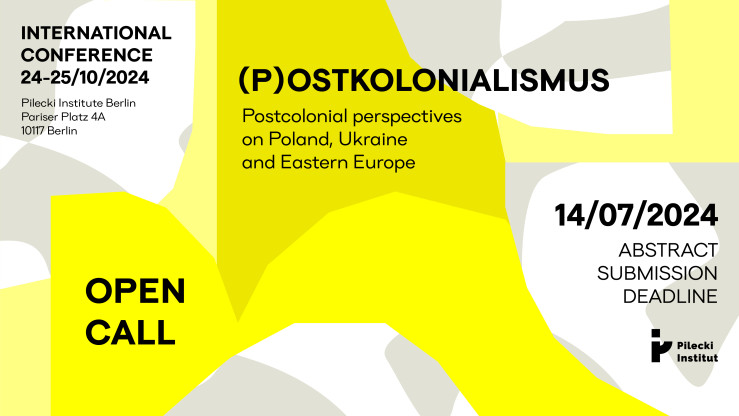Call for Contributions: (P)ostcolonialism - Instytut Pileckiego
04.06.2024 (Tue) 10:00
Call for Contributions: (P)ostcolonialism
A symposium on postcolonial perspectives on Poland, Ukraine and Eastern Europe

Call for Contributions
(P)ostkolonialismus – Postcolonial perspectives on Poland, Ukraine and Eastern Europe
Pilecki Institute Berlin, 24-25 October 2024
Deadline for submissions: 14 July 2024
In the 19th century, Poland, the so called “Wild East”, already formed part of Germany's colonial aspirations (Kopp 2012). Both Prussia and the German Empire, as well as the Nazi state, repeatedly attempted to fulfill their colonial settlement ambitions in Eastern Europe. This materialized in Bismarck's Germanization policy, the occupied territory “Ober Ost” during the First World War, and Nazi Germany's “Generalplan Ost”. The German mass crimes in the region during the Second World War were based on these continuities of anti-Slavic policies and convictions. Colonial and racist patterns of thought and behavior towards Eastern Europe continue to have an impact in many respects in the present day.
As early as the late 1990s, scholars such as Larry Wolff and Maria Todorova showed, in reference to Edward Said's Orientalism, how Eastern Europe was constructed in Western imagination as “different”, as “Europe but not Europe”. Colonial traditions of thought are also reflected in Erinnerungskultur (culture of remembrance) and historical debates. The gaps and absences in German collective memory of the National Socialist war of extermination in Eastern Europe have come to light, not only in the wake of 24 February 2022 and corresponding discourse on the Russian war of aggression in Ukraine. The Auschwitz concentration and extermination camp slowly but gradually found its way into German historical consciousness as a symbol of the industrial mass murder of European Jews. However, little attention is paid to the “Holocaust by Bullets” carried out in the territories of Ukraine and Belarus occupied by the Wehrmacht, or the extermination of Polish Jewry in the “Aktion Reinhardt” death camps. Other (Eastern) European victim groups, for example the Poles murdered as part of the “Intelligenzaktion”, the forced laborers deported from the Soviet Union or Sinti and Roma, hardly play roles in the German Erinnerungskultur (Davies 2023).
The aim of the two-day event (P)Ostkolonialismus - Postcolonial Perspectives on Poland, Ukraine and Eastern Europe, organized by the Pilecki Institute Berlin, is to examine and question the continuities of colonial traditions of thought in Germany regarding Poland, Ukraine and other Eastern European countries, their impact on the German history of violence and their influence on contemporary Erinnerungskulturen. In this context, the event aims at discussing the potentials and challenges of postcolonial and decolonial approaches with regard to addressing knowledge gaps and absences in memory. In lectures, panel discussions and interactive workshops, scholars and educators are invited to enter into conversation with each other.
We invite scholars and practitioners in historical-political and/or cultural education to submit proposals along the following questions:
- To what extent can postcolonial theoretical approaches contribute to new perspectives and a better understanding of the history of Germany's relations with Poland, Ukraine and Eastern Europe? What opportunities and challenges emerge from it?
- Which colonial paradigms can be found, for example, in historical narratives and Erinnerungskulturen, as well as in artistic approaches such as literature, film, etc.? And how can these be overcome?
- How can the discourse on this topic, which is usually limited to the academic context, be integrated into practice in the education and museum sector and, as such, be made accessible to a wider public? What challenges does this bring about?
- To what extent can postcolonial perspectives address the prevailing knowledge gaps and absences in German Erinnerungskultur when it comes to the entangled history with the region?
- Which concepts and methods can be used in research and educational work to dismantle colonial ways of thinking about Eastern Europe? What possibilities arise from artistic approaches?
- To what extent can decolonial approaches in memory and educational work contribute to encounters on equal terms?
Proposals for lectures (max. 20 min.), panel discussions (60-90 min.) and workshops (approx. 90-120 min.) may include theoretical-methodological reflections, innovative research approaches in history and cultural studies, as well as promising concepts for educational and outreach work, exhibition practice in museums or artistic approaches. The conference languages are German and English.
The Pilecki Institute Berlin covers travel and accommodation costs for speakers. Participation is free of charge.
Please send your proposals in the form of an abstract in German or English (max. 300 words) together with a short bio (max. 200 words) with the subject "(P)Ostkolonialismus" to events@pileckiinstitut.de by July 14, 2024.
Contact for questions: Lukas Wieczorek Dr. Elisabeth Katzy
e-mail: l.wieczorek@pileckiinstitut.de e.katzy@pileckiinstitut.de
phone: +49 151 646 734 67 +49 157 805 822 30